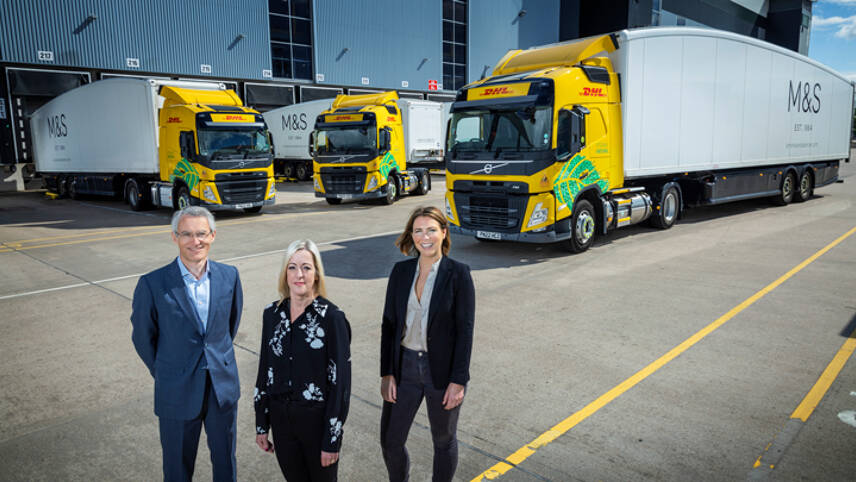Register for free and continue reading
Join our growing army of changemakers and get unlimited access to our premium content

DHL Supply Chain announced the launch of the 20 vehicles, which are Volvo’s FH Liquefied Natural Gas (LNG) tractor unit models with Globetrotter cabs, on Monday morning (13 June). They will be used to transport M&S products across the retailer’s routes in Peterborough, Swindon and Castle Donington, replacing pure diesel models.
An 80% reduction in tailpipe emissions is expected to be delivered through the introduction of the trucks, which will be powered using bio-based LNG. DHL last year began sourcing bio-LNG from Shell, which produces the fuel from agricultural waste, to power trucks for Danish pump manufacturer Grundfos. edie has requested information on the source of the bio-LNG for M&S.
Should non-renewable LNG need to be used to power the trucks at any point, they will still generate 10-20% less tailpipe emissions than their diesel predecessor, DHL said in a statement.
DHL is notably aiming to operate more than 500 LNG-powered heavy goods vehicles (HGVs) in Europe by 2025, as it works towards net-zero by 2050. The company promised to set verified 2030 emissions reduction targets through the Science-Based Targets Initiative (SBTi) last year to support this long-term vision, and pledged €7bn to deliver decarbonisation. It is yet to gain SBTi approval for these targets.
Other low-carbon transport commitments already unveiled by DHL include operating more than 80,000 electric and hybrid vehicles globally by 2030. The firm confirmed in March that it will add at least 270 new electric vans to its UK fleet by September, following the launch of 100 in 2021.
As for M&S, the retailer updated its flagship ‘Plan A’ sustainability strategy last September, with major commitments to net-zero operations by 2035 and a net-zero supply chain by 2040 among the new additions. Plan A’s webpage lists ‘zero-emissions transport’ as a priority through to 2025 – but M&S is yet to set new targets for sourcing a certain number of certain vehicles within set timeframes.
M&S’s head of transport Tim Greenwood said: “We are committed to reducing our environmental impact in line with our Plan A sustainability action plan. It’s important to us that our partners’ values and ambitions align with ours and that’s one of the reasons we have a long-standing relationship with DHL. Replacing diesel trucks for brand new bio-LNG vehicles is a good step forward in reducing our carbon emissions.”
Biogas backers
Other businesses investing in biogas trucks to reduce transport emissions include brewer Anheuser-Busch, Evri (formerly Hermes) Royal Mail and M&S competitor John Lewis Partnership, which owns Waitrose & Partners.
To date, it has been easier for many businesses to replace diesel HGVs with those powered by alternative fuels such as bio-LNG than with electric alternatives. The larger and heavier a vehicle is, the more challenging it is to electrify while retaining the same performance.
However, a new generation of electric HGVs is beginning to emerge. Sainsbury’s trialled fully electric refrigerated trailer lorries last year, integrated them into its fleet this year, and is now developing smart charging solutions for them.
Aldi UK is also trialling similar vehicles, assessing their performance in comparison to those powered with alternative fuels – as are Amazon and Carlsberg Group.


Please login or Register to leave a comment.